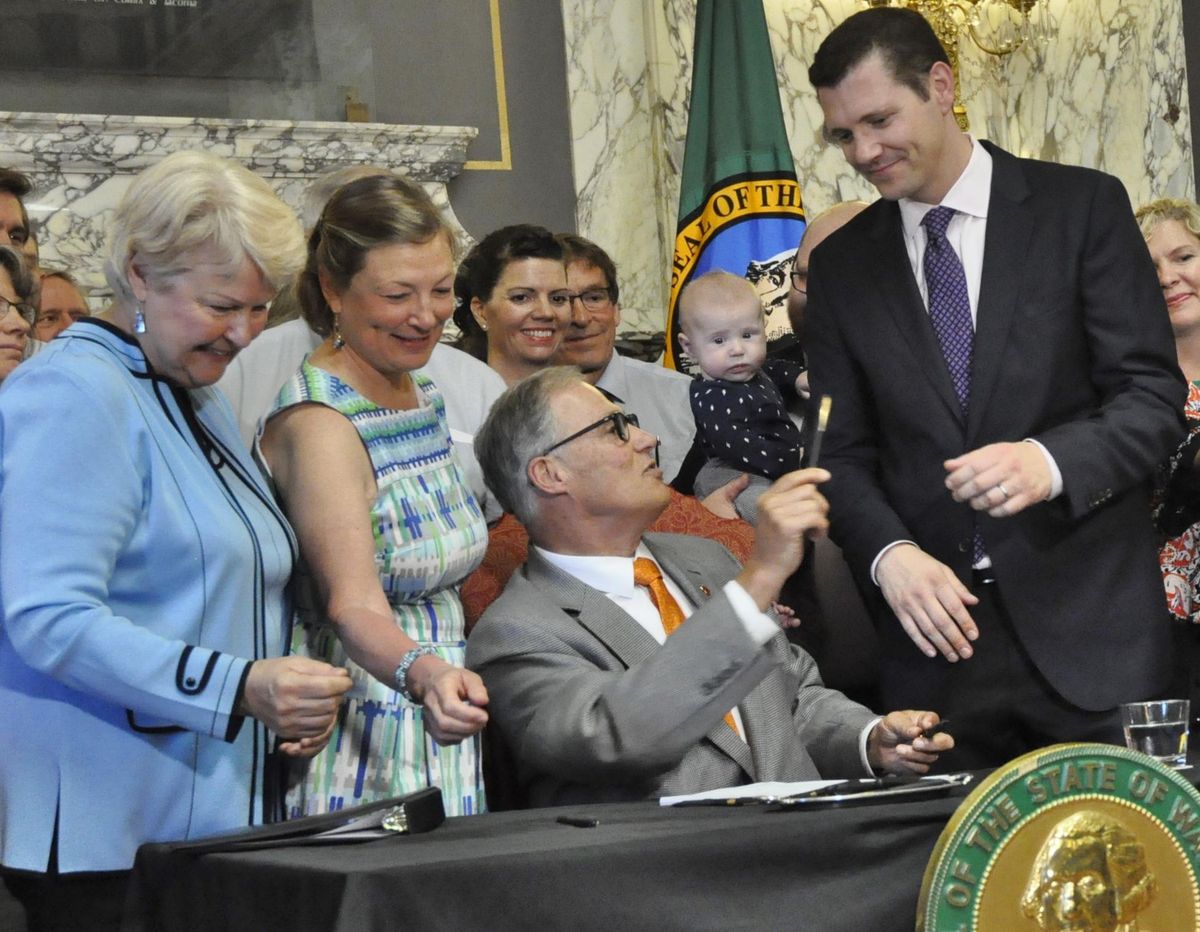Local businesses split over new paid family leave program

While many were caught unawares by a new paid family leave program passed in Olympia Friday night, some Spokane businesses weighed in with tentative optimism this week, while others cast a worried eye toward their bottom lines.
The bill, which was signed into law Wednesday and takes effect in January 2020, requires many businesses to offer 12 weeks of paid parental leave – or 16 weeks combined with sick leave – that employees can use following the birth or adoption of a child, or in cases of serious illness in the family.
Paid for via payroll taxes, employers and employees both contribute to the policy’s premium, starting with the collection of 0.4 percent of wages beginning in 2019. Self-employed workers, or businesses with 50 employees or fewer, are not required to pay the employer’s share of the premium.
New mandates often fall more heavily on small businesses than larger ones, which are better prepared to accommodate employees missing work. Avista Corp., a large Spokane employer, already offers a program that manages paid time off, said Dawnell Ellenson, a senior human resources manager at Avista. Through its program called “One Leave,” Avista permits employees to receive paid leave for myriad reasons, many of which this new law intends to cover, she said.
Providence Health Care, another large employer, told The Spokesman-Review in a statement that it supports the new paid family leave law. The company also already offers benefits that include up to 12 weeks of paid family leave.
Both Avista and Providence said they are still analyzing the new legislation to understand how their existing policies fit, and whether changes are needed. Companies that offer their own leave programs that are in line with the new law’s requirements may opt-out from the state program.
However, the story is different for small businesses, said Patrick Connor, the Washington director for the National Federation of Independent Business. The new mandate will make it even harder for businesses to stay competitive, he said.
Connor said a number of his lobbying group’s members have reported increasing difficulty competing, especially in communities along the border with Idaho. Businesses in Idaho have fewer mandates from the state, including a lower minimum wage, he said.
Neither employees nor employers are served by more burdensome mandates, he said.
“There are going to be a whole lot of workers unhappy that even more money is being taken out of their paychecks,” Connor said. “It’s ever more difficult for employers, who may have to review the number of people they employee and the number of hours they work.”
Some small business see the measure as potentially deadly to their operations. Travis Schueller, the general manager at a tiny Spokane diner called Dolly’s Cafe, said he appreciates that both employees and employers pay into the program, but that such a program would be “crippling.”
“Twelve paid weeks is insane. It’s a killer,” he said.
Dolly’s Cafe, which doesn’t have any paid leave program in place, is already short-staffed and couldn’t afford to lose an employee for such a long period of time, Schueller said. He remarked that he had already lost money recently after a new cook he had been training quit after five weeks.
A father to two kids, Schueller agreed that an employee’s time with their child is important. But he added that people need to plan how to balance work with a new child.
Kristine Munholland, a clinical assistant professor at Washington State University-Vancouver who studies child development, said 12 weeks is not very long in the scheme of a child’s life. But the attachment formed during those first 12 weeks serves as a template for a child’s social and emotional development for the rest of their life, she said.
“The quality of the bond begins in the earliest days,” Munholland said. “Once [that time] is gone, you can’t regain it.”
The law sends a message to workers, Munholland said.
“It says, ‘We’re investing in families and children,’ and that a solid foundation has value,” she said. “For parents who have to make that choice between working for their livelihood and spending time with their child – and who doesn’t have to make that choice – this is an opportunity to not have to pit one against the other.”
Gov. Jay Inslee echoed this sentiment at a crowded signing ceremony in Olympia, attended by legislators, family activists, labor leaders and business representatives. Workers shouldn’t have to choose between earning a paycheck to cover food and housing or spending time with a new child or an ailing family member, he said.
For small businesses like Spokane’s D. Lish’s Hamburgers restaurant, any big employee benefit is much too expensive, said owner Mike Lish. Instead, Lish said he tries to offer a bunch of small ones – and he plans to bring up the new state program with his employees to see if they’re interested.
“The more I look into it, I’m pretty happy with it,” he said. “Even though it doesn’t sound like I have to [pay in], I probably will go ahead and participate in it.”
Rushed through the legislature and landing on the governor’s desk just following the Independence Day holiday, the bill came as a surprise, Lish said. But he appreciated that lawmakers came together to make something that worked.
House Speaker Frank Chopp, D-Seattle, said the fight for paid family leave goes back at least 30 years, when he was an activist trying to convince lawmakers it was good policy and good politics. The bill signed Wednesday may be the largest expansion of social security in Washington in 50 years, he said, adding “Hallelujah.”
Such negotiations are only possible when people in government are willing to sit in a room, talk to each other and listen to each other, said Senate Majority Floor Leader Joe Fain, R-Auburn. “It’s exactly what I think people should expect from their government.”